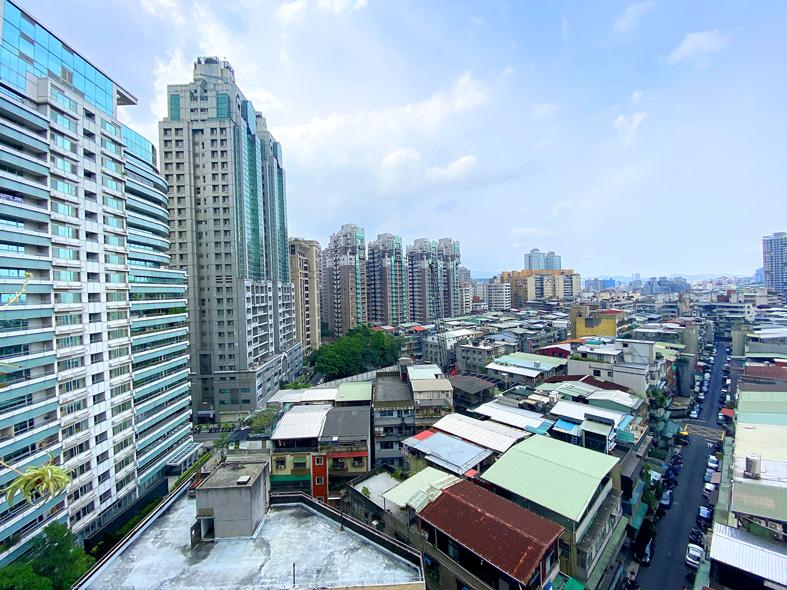The number of unoccupied houses nationwide totaled 876,000 units last year, or 11.94 percent of all houses, the Ministry of the Interior said in a report issued on Thursday.
Almost 30 percent of empty houses were owned by companies, suggesting that many corporate property owners engage in house hoarding, the ministry said.
Excluding developers and builders, companies still owned 20 percent of empty houses, it said.

Photo: CNA
The report is based on housing units’ electricity use and considers properties that use less than 60 kilowatt-hours per month as unoccupied.
The study contradicts Ministry of Finance reports saying that house hoarding subsided and there is no need for housing tax increases.
To rein in property price increases due to house hoarding, the central bank in March capped the loan-to-value ratio at 40 percent for firms and 50 percent for individuals buying their fourth or more.
The interior ministry found that New Taipei City had the highest number of unoccupied houses at 152,000, followed by Kaohsiung with 117,000; Taichung with 105,000; Taoyuan with 102,000; Tainan with 78,000; and Taipei with 68,000.
The report said that 33.47 percent of corporate-owned empty houses were held by companies that owned more than 10 houses.
Individual owners of more than 10 houses held 18.74 percent of all empty houses, it said.
A domestic COVID-19 outbreak in May prompted the central bank to postpone planned measures to rein in house hoarding, even though property and construction lending continued to rise, defying expectations of a downturn.
Separately, Miaoli County-based tile producer Champion Building Materials Co (冠軍建材) yesterday said that it is seeking to reverse losses this year by expanding its domestic market share and booking income from the sale of a production facility in China.
Champion last year incurred losses of NT$403 million (US$14.41 million), or losses per share of NT$0.93, the company told its annual general meeting in Jhunan Township (竹南) on Tuesday, citing sharp competition from low-end producers.
However, the situation might improve this year, as Champion sold an idle production facility in Kunshan, China, amid rising real-estate prices in the emerging high-tech production hub, it said.
The transaction generated NT$1.08 billion in profit, it said.
Revenue contribution from Champion’s China business was 25 percent last year, while the rest came from the domestic market, the company said.

SEMICONDUCTORS: The German laser and plasma generator company will expand its local services as its specialized offerings support Taiwan’s semiconductor industries Trumpf SE + Co KG, a global leader in supplying laser technology and plasma generators used in chip production, is expanding its investments in Taiwan in an effort to deeply integrate into the global semiconductor supply chain in the pursuit of growth. The company, headquartered in Ditzingen, Germany, has invested significantly in a newly inaugurated regional technical center for plasma generators in Taoyuan, its latest expansion in Taiwan after being engaged in various industries for more than 25 years. The center, the first of its kind Trumpf built outside Germany, aims to serve customers from Taiwan, Japan, Southeast Asia and South Korea,

Gasoline and diesel prices at domestic fuel stations are to fall NT$0.2 per liter this week, down for a second consecutive week, CPC Corp, Taiwan (台灣中油) and Formosa Petrochemical Corp (台塑石化) announced yesterday. Effective today, gasoline prices at CPC and Formosa stations are to drop to NT$26.4, NT$27.9 and NT$29.9 per liter for 92, 95 and 98-octane unleaded gasoline respectively, the companies said in separate statements. The price of premium diesel is to fall to NT$24.8 per liter at CPC stations and NT$24.6 at Formosa pumps, they said. The price adjustments came even as international crude oil prices rose last week, as traders

Taiwan Semiconductor Manufacturing Co (TSMC, 台積電), which supplies advanced chips to Nvidia Corp and Apple Inc, yesterday reported NT$1.046 trillion (US$33.1 billion) in revenue for last quarter, driven by constantly strong demand for artificial intelligence (AI) chips, falling in the upper end of its forecast. Based on TSMC’s financial guidance, revenue would expand about 22 percent sequentially to the range from US$32.2 billion to US$33.4 billion during the final quarter of 2024, it told investors in October last year. Last year in total, revenue jumped 31.61 percent to NT$3.81 trillion, compared with NT$2.89 trillion generated in the year before, according to

PRECEDENTED TIMES: In news that surely does not shock, AI and tech exports drove a banner for exports last year as Taiwan’s economic growth experienced a flood tide Taiwan’s exports delivered a blockbuster finish to last year with last month’s shipments rising at the second-highest pace on record as demand for artificial intelligence (AI) hardware and advanced computing remained strong, the Ministry of Finance said yesterday. Exports surged 43.4 percent from a year earlier to US$62.48 billion last month, extending growth to 26 consecutive months. Imports climbed 14.9 percent to US$43.04 billion, the second-highest monthly level historically, resulting in a trade surplus of US$19.43 billion — more than double that of the year before. Department of Statistics Director-General Beatrice Tsai (蔡美娜) described the performance as “surprisingly outstanding,” forecasting export growth